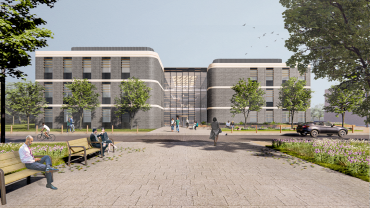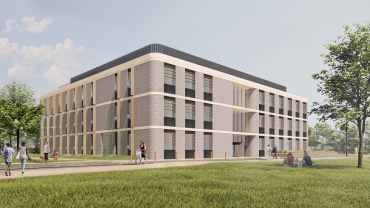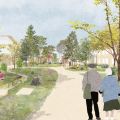Begbroke Science Park expansion gets the go-ahead
Oxford University Development Ltd (OUD) has received approval for the construction of two new buildings at Begbroke Science Park.
The project will add around a further 12,500m2 of new lab and office space to the site, almost doubling its total internal area and providing superb new facilities for innovation, collaboration, research and development.
 Artist's impression of planned commercial building
Artist's impression of planned commercial buildingThis is one of the first projects to move forward under the £4 billion partnership between Oxford University and Legal & General Group plc (L&G). OUD is a property development company set up under the joint venture to support delivery of the University’s strategic goals of creating world-class innovation districts and new housing for staff and graduate students. Its responsibilities include designing projects, applying for planning consent and consulting with local communities. Construction and delivery of the projects will be the responsibility of a special purpose vehicle set up by L&G.
 Artist's impression of planned academic building
Artist's impression of planned academic buildingThe aim is to build on the Science Park’s long history as a lively innovation ecosystem in which academic researchers work closely with the private sector to address major challenges facing society. The Science Park currently hosts some 20 research groups and 30 high-tech science-based businesses and spin-outs.
In the longer term, the University hopes to transform the wider area around the Science Park into a world-leading innovation district, including housing, schools, communal facilities, green spaces and sustainable transport links. The aim is to create a thriving new community that will benefit everyone in the area, not just the University. An international competition is currently underway to appoint a design team to create the masterplan that will guide the creation of the innovation district; the winner will be announced in March 2022; a shortlist of five teams was announced in early 2022.
 Public consultation event on 15 Norham Gardens
Public consultation event on 15 Norham Gardens
 Public consultation event on 25 Wellington Square redevelopment
Public consultation event on 25 Wellington Square redevelopment
 Public consultation event on Le Gros Clark refit plans
Public consultation event on Le Gros Clark refit plans
 History of Science Museum public consultation – 8–21 July
History of Science Museum public consultation – 8–21 July
 What’s happening at Begbroke?
What’s happening at Begbroke?